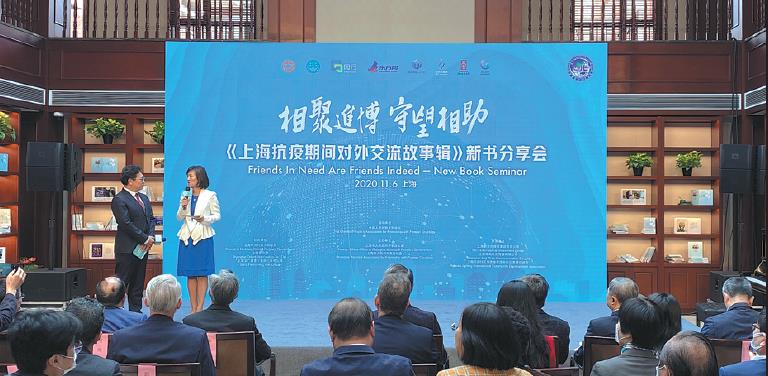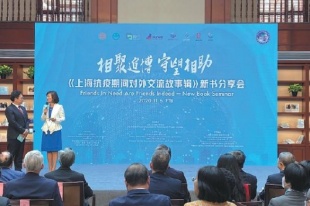Expats recount COVID-19 experiences at seminar


The seminar on Friends in Need Are Friends Indeed, a book that contains stories about the foreign exchanges that took place during the fight against the COVID-19 epidemic in Shanghai, was launched in the city on Nov 6.
Co-organized by the Foreign Affairs Office of Shanghai Municipal People's Government and the Shanghai People's Association for Friendship with Foreign Countries, nearly 100 people from domestic and foreign countries who contributed to the fight against the virus attended the event.
Featuring 57 stories, the book details the active participation of foreigners in Shanghai's epidemic prevention and control efforts, the occurrence and development of the pandemic in China and abroad, cross-border donation of medical masks, as well as how local and foreign enterprises managed to resume operations after the situation came under control.
According to statistics from the State Bureau of Foreign Experts, the number of foreigners working in Shanghai as of January 2019 was 215,000, accounting for 23.7 percent of the country's total and ranking first in the country.
"The book is an entry point for a better understanding of people-to-people exchanges during the pandemic. It is made up of personal stories that cover the mutual assistance people from home and abroad rendered to each other, in the fields of culture, education, science and technology, health, medical care, economy and trade," says Sha Hailin, director of the Shanghai People's Association for Friendship with Foreign Countries.
"Upon reading these stories, one can reach only one conclusion: In face of the raging virus, no one can stand alone and survive. It is only by supporting each other and cooperating closely, regardless of nationality or ethnicity, that we can finally gain an upper hand against this virus," he says.
Marcel Gauthier, principal of Shanghai American School, shared a similar comment on the book.
"To me, it is a theme that is crucial at this moment in time. What I'm impressed by is how the book realizes that the world is somewhat fragmented, and the efforts that we have put in to unite it is what will help the world to move forward," he says.
Gauthier adds that he was heartened to see students from his school coming together to raise funds to support Wuhan, which was the epicenter of the outbreak.
"I must say that the narrative did change, because once China gained control over the outbreak, China was the one supporting the expat institutions here. That was something really inspiring to me," he says.
Andrew Lancaster, principal of the British International School Shanghai, recalls that the city reacted very quickly to the crisis.
"As an expat living here, I felt very reassured and knew that we were safe. There were very clear protocols in place that we had to follow, and I think one of the successes that we've seen in the city was how people followed the rules carefully and stayed apart and isolated," says Lancaster.
"Also, it was still relatively easy to buy goods and household items."
During the seminar, Lancaster also shared an anecdote about how students who were still back in their home countries helped support one another during the crisis. The students, who were preparing for their examinations through online learning, also communicated with their teachers every week.
"What impressed me most was how everyone supported each other and tried to lower anxiety levels by telling stories of what they've been doing during the week," he says.
"It was really heartwarming to know that the children were cheering each other up and supporting each other despite being in different locations."
Marlon Devonish, the high-performance coach of the British International School Shanghai, also shares his experience of returning to the city in August.
"One thing I thought when coming back was that there is no way the virus is going to get in," says Devonish, who is a former Olympic sprint champion.
"There was a clear and strict protocol, and I had to prepare lots of documentation, which was annoying but very necessary to reduce the chances of the virus entering Shanghai. I felt completely safe."





































